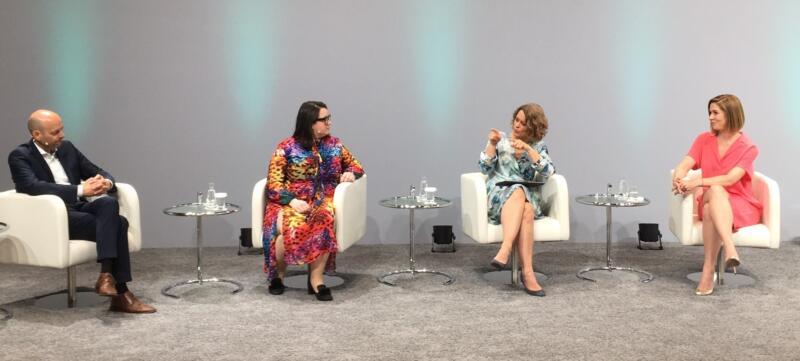Trust as a currency: CDR Initiative discusses ways to shape digital transformation
The CDR Initiative of the German Federal Ministry of Justice and Consumer Protection invited prominent representatives from politics, business and civil society to its CDR Conference to discuss human-centric approaches to digital transformation.

Berlin, 18 June 2021 How can we shape digitalisation in a human-centred approach that serves the common good? And what role do different actors from business, politics and civil society play in this? These were the fundamental questions explored at the CDR conference hosted by the Ministry's CDR Initiative on June 9 – with participants attending both virtually and in-person. In the spacious studio of the DBB Forum in Berlin, the moderator Anja Heyde and several panellists were able to come together to discuss these issues, all while ensuring social distancing.
Profitability vs. ethical actions: overcoming deep-rooted contradictions
At the opening of the conference, Minister of Justice and Consumer Protection Christine Lambrecht explained that ethical actions and profitability are not incompatible:
-

“Only those companies that consumers can trust will be able to remain competitive in business. None of us can avoid the process of digitalisation, which is why we must harness its potential for the benefit of society.”
Christine Lambrecht
Federal Minister of Justice and Consumer Protection
Prof. Dr Maja Göpel, economist and Director of Research at the think tank The New Institute, also spoke in her keynote speech about overcoming apparent contradictions in the debate around sustainability and profitability. Instead of pitting innovation and sustainability against each other, our thoughts should instead focus on digitalisation as a driver for sustainability.
Trust cannot be ordered by law
The panel discussions took a close look at CDR issues in general and the impetus given by the CDR Initiative in particular. Whether in the studio in Berlin or via video, the panellists brought a broad range of perspectives to the discussion from their very different backgrounds and personal experiences.
Yet one key concept came up again and again in the discussion: trust. State Secretary Prof. Dr Christian Kastrop from the Federal Ministry of Justice and Consumer Protection emphasised right at the beginning that "trust cannot be ordered by law", but instead must be earned through actions. That is the only way, he argued, to achieve general acceptance for digitalisation among citizens in the long term. At the same time: “wherever trust is squandered, entire sectors of the economy may be impacted.” State Secretary Kastrop also referred to a current representative survey commissioned by the Justice Ministry, which highlights just how seriously German consumers take corporate social responsibility. According to the survey, however, companies were still at times slow to take on responsibility. "Too often, concerns – for example about data theft or financial fraud – are a defining feature of digital everyday life in Germany," said Prof. Kastrop. In response to this, the State Secretary appealed to the corporate world in general to catch up.
Corporate responsibility in practice: more than just lip service The fact that companies are well aware of their responsibility and do not just talk the talk was demonstrated by members of the CDR Initiative. Both Joachim von Schorlemer, Deputy Chairman of the Executive Board of ING Deutschland, and Petra Scharner-Wolff, Member of the Executive Board for Finance, Controlling and Human Resources at Otto Group, spoke of the enormous internal and external impact of corporate responsibility. This should not only exist on paper, but must also be put into practice in day-to-day business. "Only if we are serious about corporate responsibility will our customers and also our employees take us seriously," explained Joachim von Schorlemer. Adding to this, Ms Scharner-Wolff also emphasised the concrete added value of an ongoing exchange between business, academia, civil society and politics, as is facilitated by the CDR Initiative. Such an exchange makes it possible to identify at an early stage the relevant fields of action for a value-oriented digital transformation. A discussion on these topics also supports businesses in developing guidelines for their own activities and for the daily work of their employees.
Trust, but verify...
Civil society was represented at the conference by Carla Hustedt, Head of "Digitalised Society" at the Mercator Foundation, and Elisabeth Lindinger, Managing Director of Superrr Lab, which deals with questions of discrimination in AI applications. They spoke about the need for transparency as well as for evaluations of CDR measures. "Academia and NGOs in particular can play a key role by defining processes and developing indicators for the effectiveness of CDR measures," Lindinger said. In this respect, it is particularly important to conduct a critical discourse to assess the effectiveness of specific CDR measures: "Many companies have recognised the importance of using digital technologies responsibly and have developed their own guidelines to this end. However, in order for these to be effective, we need to be specific about terms such as transparency or fairness and translate them into verifiable measures," said Carla Hustedt.
CDR: one term, many question marks
In the second part of the event, the discussion focused specifically on CDR measures and the work of the CDR Initiative. In her introduction, moderator Anja Heyde pointed out an Achilles' heel of all efforts towards CDR: The rather technical term “CDR” meant little or nothing to many citizens. Nevertheless, according to Birgit Klesper, Senior Vice President of Group Corporate Responsibility at Deutsche Telekom, this is no reason to hang our heads: "No matter what we call it, it's about companies taking on digital responsibility – and that is a term more and more people are familiar with. It is about being transparent with consumers about what specifically we are doing, and making it clear that they can also verify our performance."
Darija H. Bräuniger, Senior Manager of Public Affairs at Zalando, illustrated this with a concrete example: At Zalando size recommendations are given in order to help customers find the right size and reduce returns. Data generated in the event of returns is also used for this purpose. "It is crucial that we inform our customers about what exactly such recommendations are based on – in order to create transparency and build trust," says Bräuniger. This example shows how corporate responsibility can also be something tangible for customers during their shopping experience.
Valentina Daiber, Chief Officer of Legal & Corporate Affairs at Telefónica Deutschland, emphasised that digitalisation could become an important driver for sustainability and thus also for CDR. "However, this requires maximum creative power," said Daiber, "built on a broad social alliance with the aim of shaping digitalisation in the interests of all."
Inclusive thinking: CDR must appeal to the whole of society
For Lena-Sophie Müller, Executive Director of Initiative D21, trust-building communication requires a differentiated approach: "Responsible corporate action means recognising that digital society is very heterogeneous. We have to make sure that ideally everyone is able to benefit, for example through target group-specific communication. With regard to the digital gap, older people or people without a university degree must be given more consideration." In this context, Prof. Dr Dr Alexander Brink from the University of Bayreuth added that the Code drafted by the CDR Initiative and signed by the first companies is also an important milestone. In the field of action "inclusion", for example, the signatories commit to lowering barriers to access to their services for customers. "The Code is an important instrument for establishing organisational trust, which is becoming increasingly important in the online world where anonymity is prevalent," says Brink.
In the end, the participants agreed that the term "inclusion" was to be understood as both an aspiration as well as a duty for the future. Indeed, when asked about their main wishes for the future of CDR, there was a consensus amongst the panellists: We need to get more people on board, including internationally, for the concept of corporate responsibility in the digital age. The next CDR conference, which is planned to take place once a year in future, could shed light on how that can be achieved.
